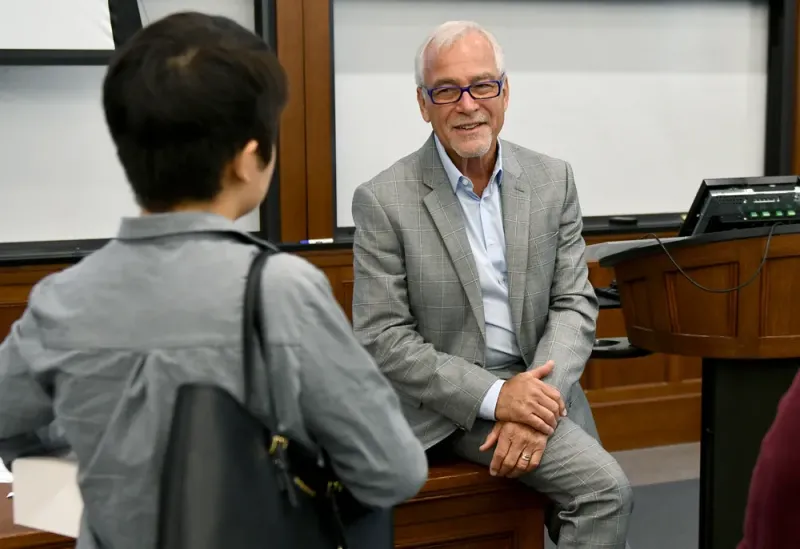
Any success in life is a combination of three things: talent, hard work, and luck, says Tim Kochis, ’73. While Kochis admits he’s had a few lucky breaks in his 45-year career as a personal finance and investment manager, he also attributes his success in large measure to his Michigan Law degree, which has proven to be a “valuable calling card” among his clientele.
“There is nobility and prestige associated with legal education,” says Kochis. “But, more important, one of the great skills you learn to hone in law school is critical thinking, which can be applied to any profession. You learn to make careful distinctions based on facts and circumstances at a particular time, and it’s a skill set that serves you well in any professional or business context.”
Kochis, who is admitted to the Illinois and California Bar, didn’t enter law school thinking he would pursue financial planning as a career. He interviewed with several law firms and a legal office within the U.S. House of Representatives after graduation but took a job with Continental Bank, which was then the largest bank in his hometown of Chicago. “It seems trivial in retrospect, but it was $200 more than the next best offer,” Kochis says. Continental had recently established a financial advisory service for executives, “and because they wanted to convey prestige and intellectual capability, they only wanted lawyers to staff it. What it did for me was deploy some of the technical content I learned in law school—I took tax classes and trusts and estates classes—and put me in a situation where I was able to become a pioneer in the financial planning field.”
Kochis stayed at Continental for five years, then moved to Hewitt Associates, where he worked in executive compensation for a year. The time was right to relocate to sunny California—a place where Kochis had set his sights years earlier—because Chicago had had three consecutive brutal winters and Kochis had just completed his MBA at the University of Chicago. He joined Bank of America—first in Los Angeles and then in San Francisco—and later Deloitte & Touche, where he led both organizations’ personal financial planning divisions until, in both cases, the firms restrategized their priorities. Kochis’s field was not one of those priorities at those times.
“Starting my own business was an easy choice,” says Kochis, who, with a Deloitte co-worker, formed Kochis Fitz in the 1990s. “When I said I was going to take the business out on my own, the knee-jerk reaction from Deloitte was, we’ll see you in court.” Kochis put his negotiating skills to work and offered Deloitte a 10 percent royalty on his business for a year if he was given permission to take on its clients. Deloitte agreed, and even sold Kochis the intellectual property he had created for one dollar.
As Kochis’s firm grew, so did his view of financial planning, which became global. He developed an interest in emerging markets, particularly in Asia. “Sixty percent of the world’s population lives in Asia, and about 40 percent in China and India alone,” says Kochis, who now leads his own consulting firm, Kochis Global. “There’s so much new wealth being created in that part of the world, and it will continue to be created there for a long time to come. This is the first generation where there is a large number of people with enough money to make decisions about it. Having a financial planning profession to help them make good decisions about their money is a real service to the world, because making good financial decisions benefits everyone.”
Kochis has written six books about wealth management and financial planning, as well as numerous articles and book chapters, and he’s helped to advance the financial planning profession through his service with professional and nonprofit organizations dating back to the 1970s. He also taught thousands of students in the financial planning program he founded at the University of California, Berkeley.
“The kinds of activities I’ve been involved in—helping clients articulate what their objectives are about money and motivating or persuading them to take actions appropriate to the accomplishment of those objectives—have allowed me to use the skills of a lawyer throughout my career,” says Kochis. “Having a JD has been hugely helpful to me—personally, professionally, and financially. The intellectual satisfaction, however, is probably at the top of the list.”







